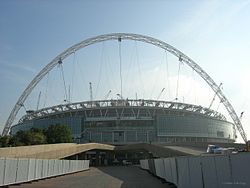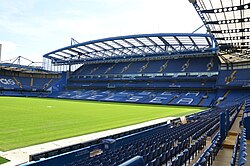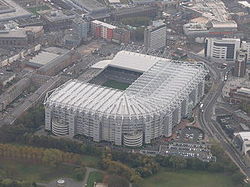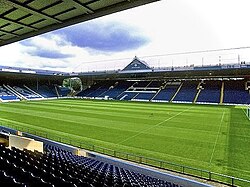Venues
To host a FIFA World Cup opening match, semi-final or final, a stadium must be able to hold 60,000 people. [2]
At the heart of the 2006 bid was the new Wembley Stadium, with a capacity of 90,000. [2] Old Trafford in Manchester held 61,000 in 2000, but had plans to expand to 68,400 by the time of the tournament, while the 1997-built Stadium of Light in Sunderland would also grow, from 42,000 at initial construction to 63,000 by 2006. [2] New stadiums, at Ashburton Grove for Arsenal and Stanley Park Stadium for Liverpool, would be built to house over 60,000 fans each, while new grounds with capacities of more than 40,000 would also be built in Coventry (now known as the Coventry Building Society Arena) and Leicester (the Walkers Stadium). [2] The City of Manchester Stadium, construction for which had begun in January 2000, would be used for both the 2002 Commonwealth Games and the 2006 FIFA World Cup as well as becoming the home ground of Manchester City, [2] having been the centrepiece of an unsuccessful Mancunian bid to host the 2000 Summer Olympics.
The other existing stadiums that were nominated were Aston Villa's ground, Villa Park in Birmingham and St James' Park in Newcastle upon Tyne, both holding over 50,000, as well as 40,000-seater stadiums Pride Park in Derby, Leeds' Elland Road, [3] Goodison Park in Liverpool, the Riverside Stadium in Middlesbrough, Hillsborough in Sheffield, and Stamford Bridge in West London. [2]
| London | Liverpool |
|---|
| Wembley Stadium | Emirates Stadium | Stamford Bridge | Stanley Park Stadium | Goodison Park a |
| Capacity: 90,000 | Capacity: 60,400 | Capacity: 40,000 | Capacity: 60,000 | Capacity: 40,000 |
 |  |  | |  |
| Manchester | |
|---|
| Old Trafford a,b | City of Manchester Stadium |
| Capacity: 68,400 | Capacity: 47,717 |
 |  |
| Newcastle | Leeds |
|---|
| St James' Park b | Elland Road b |
| Capacity: 52,000 | Capacity: 40,000 |
 |  |
| Sunderland | Birmingham |
|---|
| Stadium of Light | Villa Park a,b |
| Capacity: 63,000 | Capacity: 47,300 |
 |  |
| Nottingham | Derby | Coventry | Sheffield | Middlesbrough |
|---|
| City Ground b | Pride Park | Coventry Building Society Arena | Hillsborough a,b | Riverside Stadium |
| Capacity: 40,300 | Capacity: 40,000 | Capacity: 40,000 | Capacity: 40,000 | Capacity: 40,000 |
 |  |  |  |  |
a: Stadium used in 1966 FIFA World Cup
b: Stadium used in UEFA Euro '96
Timeline
In 1993, the chairman of the Football Association (the FA), Bert Millichip and his German counterpart agreed that the FA would back Germany's bid for the 2006 FIFA World Cup and that Germany would support England's Euro 96 bid. Both bids were ultimately successful. By 1996, England had withdrawn its support for the Germany bid and decided to make their own bid, losing the support of UEFA president Lennart Johansson in the process. As a result, England put its support behind Sepp Blatter in 1998, rather than rival Johansson, for the FIFA presidency. Blatter had, however, already publicly supported South Africa's bid.
The FA went on to make a series of misinformed decisions to the detriment of the bid. This included FA chief executive Graham Kelly and chairman Keith Wiseman unsuccessfully attempting to remove the Scottish Football Association's David Will from the FIFA executive and replace him with Wiseman, culminating in both Kelly and Wiseman being removed from their posts. The FA, mindful of Thailand's vote on the 24-man executive, offered the Thailand national football team the services of Peter Withe as head coach.
Five companies were names as sponsors of the bid: British Airways, Littlewoods, Marks & Spencer, Nationwide Building Society and Umbro. [4] A press advert was released by Saatchi & Saatchi in May 1998. [5]
In 1999, England arranged a friendly with Malta before Euro 2000, securing England a vote. Later that year, Blatter reaffirmed his support for South Africa, despite a visit from British prime minister Tony Blair.
In April 1999, Bobby Charlton announced that as part of the bid, a dozen children from each of the 203 FIFA-affiliated nations would be guests of the FA during the tournament. [6]
The 1998–99 FA Cup winners, Manchester United, withdrew from the 1999–2000 competition due to their participation in the 2000 FIFA Club World Championship in South America, to take place in early 2000, [7] thus becoming the first FA Cup winners not to defend their title. This was at the request of the FA, which believed it would aid the 2006 bid. [8] Tony Banks, the Minister for Sport, said he believed that the bid would receive "irreparable damage" if United did not partake in the maiden FIFA Club World Championship. [9]
On 9 August 1999, the 2006 bid was presented to FIFA. [1] The bid documentation was designed by Leeds-based firm Elmwood. [10]
In May 2000, the bidding nations had representatives in Malaysia to present to the Asian Football Confederation. [11]
Shortly before the 2000 UEFA Cup Final between English club Arsenal and Turkish side Galatasaray, there were clashes between British and Turkish fans. As well as Arsenal fans, it was reported that followers of English clubs Chelsea and Leeds United, as well as Scottish side Rangers and Welsh teams Cardiff City and Swansea City, had travelled to Copenhagen to engage with the Turks. [12] This incident shocked UEFA deeply. [13] These concerns intensified during Euro 2000, as there were hooligan riots caused by England fans and UEFA's stance against the English bid hardened as a result. [14]
On 3 July 2000, Brazil withdrew its bid and pledged support for South Africa's. On the same day, the English bid was criticised by FIFA for the way in which it was conducted. [15]
On 5 July, the countries made their final presentations to FIFA.
This page is based on this
Wikipedia article Text is available under the
CC BY-SA 4.0 license; additional terms may apply.
Images, videos and audio are available under their respective licenses.















